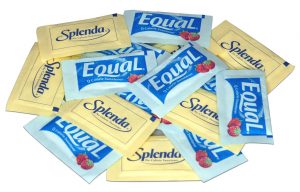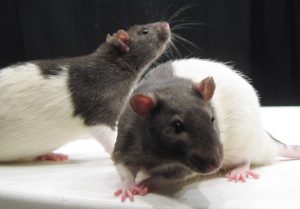Everyone likes a little sweet in their life, whether it’s that extra chocolate chip cookie, or adding a teaspoon of sugar to your morning coffee.

Figure 1. Coffee with a sugar cube being added to it. (Image source)
Because sugar can have many adverse effects on health, artificial sweeteners have been used instead to provide the same sweet taste. These include Sweet n Low, Splenda, and Equal just to name a few. However, even though these alternatives provide a low calorie substitution, there has been a lot of controversy to whether or not they are actually better for your health.

Figure 2. Artificial sweetener packets, including Splenda and Equal. (Image source)
Sugar can cause many different problems when eaten at a high level, including; type 2 diabetes, obesity, inflammation, heart disease and even cancer.
The first artificial sweetener, saccharin, was discovered in 1879 when a chemist discovered that his food tasted sweeter after work and went on to taste all the chemicals he was using in his lab. After that, more artificial sweeteners have been found and have been targeted towards diabetics, and those wanting to lose weight.
The FDA is the organization that approves foods and drugs with the responsibility of protecting the public health. There are currently eight approved artificial sweeteners in the United States. These eight approved sugars have all been deemed safe by the FDA as long as they are used in moderation.
So why do so many people rebel against the idea of ingesting anything artificially manufactured?
The media plays a big part in this. There were several false animal studies done on rats that linked artificial sweeteners to cancer. While the FDA states that these were poorly executed experiments and that they provided false conclusions, the public still has a hard time getting this information.

Figure 3. Two laboratory rats. (Image source)
In 1980, after a study falsely connected aspartame with brain cancer, there was a wide media outbreak that ended with FDA banning aspartame. However, once more research was done, the FDA quickly lifted their ban in 1981. The FDA continues to state that aspartame is safe to consume at acceptable levels. Yet, even with this research available, many people still believe that aspartame is to blame for many adverse symptoms.
Why?
Research is currently hard to understand at a public level, and the truth can be difficult to find as people can form an accidental bias when reporting.
To help the public truly understand these controversies, there has to be a way in the future to allow the public better access to these scientific discoveries. Making science more accessible will benefit society as a whole as more individuals will be able to form their own opinions.
For now though, it is safe to say that you can fill your sweet tooth craving with an artificial sweetener instead.
